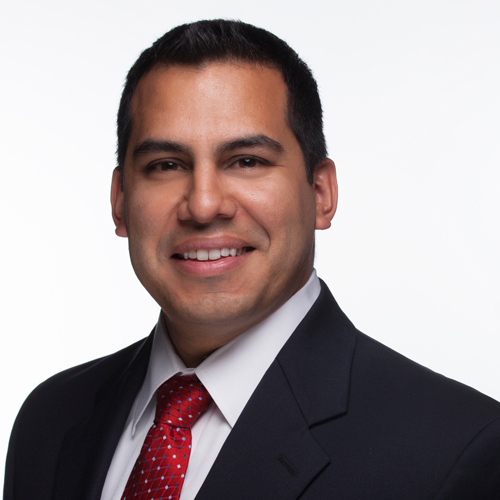Benjamin Hernandez’s career in public health originally came as something of an accident.
As an undergraduate majoring in political science, Hernandez had an internship at City Hall, which eventually turned into a full-time job as a policy advisor. Three years into his career, Hurricane Ike hit Texas. Hernandez volunteered to evacuate people and provide aid assistance during that year. The Houston Health Department director took notice and offered Hernandez a job.

After having the chance to familiarize himself with the idea of a career in politics, Hernandez felt a move toward public-health policy would enable him to have a more proactive impact on the community. Since joining the department in 2008, his role has evolved a number of times. Hernandez is currently the chief financial officer for the Houston Health Department, one of the largest municipal public-health departments in the nation.
As CFO, Hernandez is responsible for the funding of health policy for one of the most populated and multicultural cities in the United States. Houston’s demographics are 43.8 percent Hispanic, 6 percent Asian American, and 23.7 percent African American. The city is home to a multitude of international ethnic groups.
“This is a diverse city with diverse needs,” Hernandez says.
The Houston Health Department, Hernandez explains, is driven by these needs. “To be healthier as a community, we have to find ways to address specific health issues across a variety of populations,” he says.
Chronic disease prevention is a major focus for the department. Diabetes, one of Houston’s biggest health challenges, has been a long-term pain-point, but the Houston Health Department is refocusing funds to bring about change.
Houston is a member of the Cities Changing Diabetes alliance and Hernandez makes sure that resources are leveraged for prevention programs. One such program funds diabetes-awareness centers, targeted towards at-risk groups or those already living with diabetes. The awareness centers increase access to diabetes prevention, self-management, and coordinated care. “The goal here is to prevent disease, rather than just treat it,” Hernandez says.
On a federal scale, the health-care system is changing from a service-based system toward a health-driven business model. The country is looking more and more at population health and its benefits, and Hernandez has no doubt that this approach will have a positive on impact the health of the nation.
“There’s always going to be disease to treat, but there are also many we can prevent,” he says. “The general public doesn’t generally think about public health outside of restaurant inspections and communicable disease. It is up to us to focus on prevention to make every community stronger.”
Fortunately, prevention strategies continue to gain public visibility and support. Recent federal menu-labeling mandates, for instance, empower people to make better health choices. “Knowledge is powerful. When a person looks at the fat-and-calorie content before they order a Big Mac at McDonald’s and decides not to order it, that’s public health in action,” Hernandez says.
He points to Houston’s surveillance program, which covers a range of issues—from behavioral health to the flu—as another triumph. The department taps into resources like pharmacy purchases to track trends that might lead to disease prevention. If community pharmacies are selling more cough medicine than usual, for example, it’s an indication that something is going on in the community that the department needs to pay attention to.
11%
of Houston’s adult population has diabetes
13.2%
of Latino adults over 18 has diabetes.
32%
of Houston’s adult population is obese. Obesity is a key contributor to type-2 diabetes.
Source: www.citieschangingdiabetes.com
“It gives us a pulse of the community and enables us to respond to immediately and effectively,” Hernandez says. In turn, this and other programs under Hernandez’s authority create a lasting impact on public health.
Other successful strategies come from the fostering and leveraging of creative collaborations. Hernandez oversees the Houston Health Foundation, which provides a funding stream of $25 million to support public-health projects beyond the normal scope and capacity of city operations. The foundation’s mission is to ensure that every child has a healthy start in life, providing vital services like access to fresh produce, oral-health screenings and sealants, vision exams, and no-cost prescription glasses.
Hernandez is especially proud of his involvement in the 2012 expansion of the See-to-Succeed program, a partnership with local school districts that provides free eyeglasses for children. He has been able to see the partnership grow and develop its own management structure. Houston-area vision clinics have seen over 20,000 students and given over 18,000 pairs of glasses. Since its inception, the program’s capacity has increased by 500 percent.
Ideas are exciting but it’s tangible results that drive Hernandez and his team day-to-day. Known as an executive who is highly invested in his staff, he recognizes that having a highly engaged workforce enhances performance, hiring, and retention.
Furthermore, he knows that the public-health sector has one of the most highly educated workforces on any industry. He trusts his team to be able to translate public-health knowledge into everyday language and actions that the community can understand.
Ultimately, Hernandez and his team will continue to focus on innovation, data-driven decision making, and strong business principles to ensure financial stewardship. Every dollar spent has to translate to an outcome. In his current role, he is invigorated to know that dollars spent drive positive changes for his community.
Houston Health Department
Headquartered: Harris County, TX
Population: 4.3 million
Number of Employees: 1,200
About: The Houston Health Department (HHD) provides traditional public-health services and seeks to use innovative methods to meet the community’s present and future needs. HHD is the first health department in Texas and the second in a large US city to earn national accreditation.

